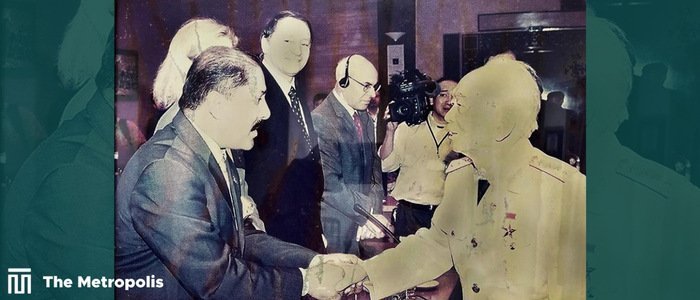Ashraf ud Doula-
It was a great pleasure for me to have had the opportunity to serve my country- Bangladesh as its Ambassador to Viet Nam from 2002-2004. My stay in Vietnam allowed me to not only admire and appreciate the great Vietnamese people’s struggle for self-determination, the abundant beauty of the Country, but also to make my humble contribution to the development of our 50-year bilateral relations.
Those of us who were born in the 50s grew up with the Vietnamese’s struggle for national independence. Viet Nam’s victory over French occupation in 1954 was a household story in the mid-and-late 50s, and reading those stories added a lot of thrills in our conscience-a natural sympathy for the underdog and fellow third-world country. Our interest in Viet Nam intensified after the US launched in 1963 a full-scale war against the North Viet Nam – the Democratic Republic of Viet Nam, which began a spate of killing and maiming an umpteen number of people by indiscriminate bombing and spraying of agent orange from the air, the effect of which is still carried by many later born people of the country.
As young people, being proselytized by the global events of the 60s, we embraced the Vietnamese tragedies as our own and any reports of US new aggression agitated our adolescent minds. For instance, the My Lai massacre would never erase our consciences.
The Offensive Campaign in January 1968 – the massive attack on the American forces, we got bamboozled and a few of our friends took vows to go to Viet Nam to fight the gringos. It was no doubt a momentary juvenile humbug, and by the next morning, not unexpectedly, all our excitement tapered off. But, the names of the great Vietnamese leaders – Ho Chi Minh and General Giap were firmly embedded in our hearts and minds. Little did we realize that the humbuggery of that January wintry afternoon at our youthful age indeed planted the seeds of patriotism in our conscience. And, only three years later, in 1971, when my country came under such an ordeal, it didn’t take a moment’s hesitation for me to join our liberation war as a freedom fighter to liberate the country from the hands of the enemies. Indeed, General Giap’s book “Dien Bien Phu”, was my most valued possession during the liberation war, which I read repeatedly day after day. What was even more fated, was that I never imagined in my wildest dream that one day I would come to Viet Nam as the Ambassador of my country.
In September 1945, the great leader and the founding father of modern Viet Nam, Ho Chi Minh, known as Uncle Ho, declared the independence of Viet Nam in front of a mammoth crowd. In his independence speech, he thundered, “We, (the) members of the Provisional Government of the Democratic Republic of Viet Nam, solemnly declare to the world that Viet Nam has the right to be a free and independent country, and is so already. The entire Vietnamese people are determined to mobilize all their physical and mental strength, to sacrifice their lives and property to safeguard their independence and liberty”.
One could find an echo to Bangabandhu’s 7th March speech calling upon his people to be ready to fight the enemy with whatever they could lay their hands on. “Ebarer Sangram, Shadhinatar Sangram. Ebarer Sangram Muktir Sangram. rakto jokhon Elgar diechi, darkar holey aaro rakto debo. Tabu edeshke Shadhin kore charro, InshAllah. Tomader ja kichu ache tai nie Tomra prostut thako (The struggle this time is the struggle for independence. The struggle this time is the struggle for freedom. Once we have spilled our blood, if necessary, we will spill more blood. Yet we will snatch our independence. I ask you all to prepare yourselves to fight the enemy, with whatever you can lay your hands on”.
In my mind, the above sentiments expressed by their respective leaders in words coming from their hearts, are the philosophical foundation for building strong ties between Viet Nam and Bangladesh.
In February 1973, the People’s Republic of Bangladesh established diplomatic relations with the Democratic Republic of Viet Nam, and then with the Provisional Revolutionary Government of the Republic of South Viet Nam – a formal governmental structure to the National Liberation Front of South Viet Nam representing the Southern people. Right after that, Viet Nam opened its resident mission in Dhaka in early 1974, however, it closed its Embassy in 1982, due to economic constraints. Viet Nam reopened its mission in Dhaka in 2003. On the other hand, Bangladesh opened its Mission in Ha Noi in 1993.
As the Ambassador of Bangladesh to Viet Nam from 2002 to 2004, I would like to highlight a few of my achievements in Vietnam. During my stay in Viet Nam, I successfully persuaded the Vietnamese Government to reopen its resident mission in Dhaka in 2003. It was also during my tenure, the President of Viet Nam, H.E. Mr. Tran Duc Luong visited Bangladesh in 2004. There is an interesting anecdote about the visit. Before the commencement of the visit, I was invited by the President for a one-to-one meeting. I had no idea what he wanted to discuss with me. It was neither decent to enquire what he had in mind. So, I arrived at the meeting with several theories in my mind. Except for an interpreter, there was no one at the meeting. After enquiring a few details about Bangladesh, he asked my opinion as to what the two countries could do during his visit to Dhaka. I thought for a moment and it came to mind that Viet Nam was a major importer of medicines, and since Bangladesh had by then set up several pharmaceutical factories, producing quality and affordable medicines, this could be an area where the two countries could effectively cooperate. I briefed the President about our pharmaceutical factories and urged him to visit a factory in Dhaka. I added that our medicines were of high quality and much cheaper than elsewhere. I commented that Viet Nam could save its much scarce foreign currency by importing medicines from Bangladesh.
As per my recommendation, our Foreign Ministry arranged a visit to the Square Pharma factory in Tongi for President Tran Duc Luong during his sojourn to Bangladesh. I accompanied the President on his visit to the factory and he shared his thoughts with me, saying that he didn’t know that Bangladesh could boast such a state-of-the-art factory. The visit played a key role in opening the Vietnamese pharmaceutical market for Bangladesh.
In the past 50 years, the bilateral relations have prospered by leaps and bounds, covering the entire gamut of cooperation: political, economic, cultural and people-to-people interaction. There have also been several high-level visits, including at the highest level, between the two countries over the years. These VVIP visits have added fresh impetus to the already excellent bilateral relations between Bangladesh and Viet Nam.
The two countries share common membership in a number of international and regional organizations. They have also signed several agreements, protocols, and MOUs related to trade and other areas of mutual interest.
The bilateral trade between the two countries is currently valued at nearly 1.5 billion USD, which has the potential to surpass 2 billion dollars in the next couple of years. Bangladesh’s exports to Viet Nam consist of pharmaceutical products, jute and jute goods, and scrap iron, while Viet Nam exports to Bangladesh communication equipment, cement and clinker, gravel and crushed stone.
As we celebrate the 50th anniversary of the establishment of diplomatic relations with Viet Nam, given that we have multifaceted similarities with Viet Nam, our relationship could also be expanded, encompassing several areas for mutual benefit.
The writer is a former Bangladesh Ambassador to Vietnam




